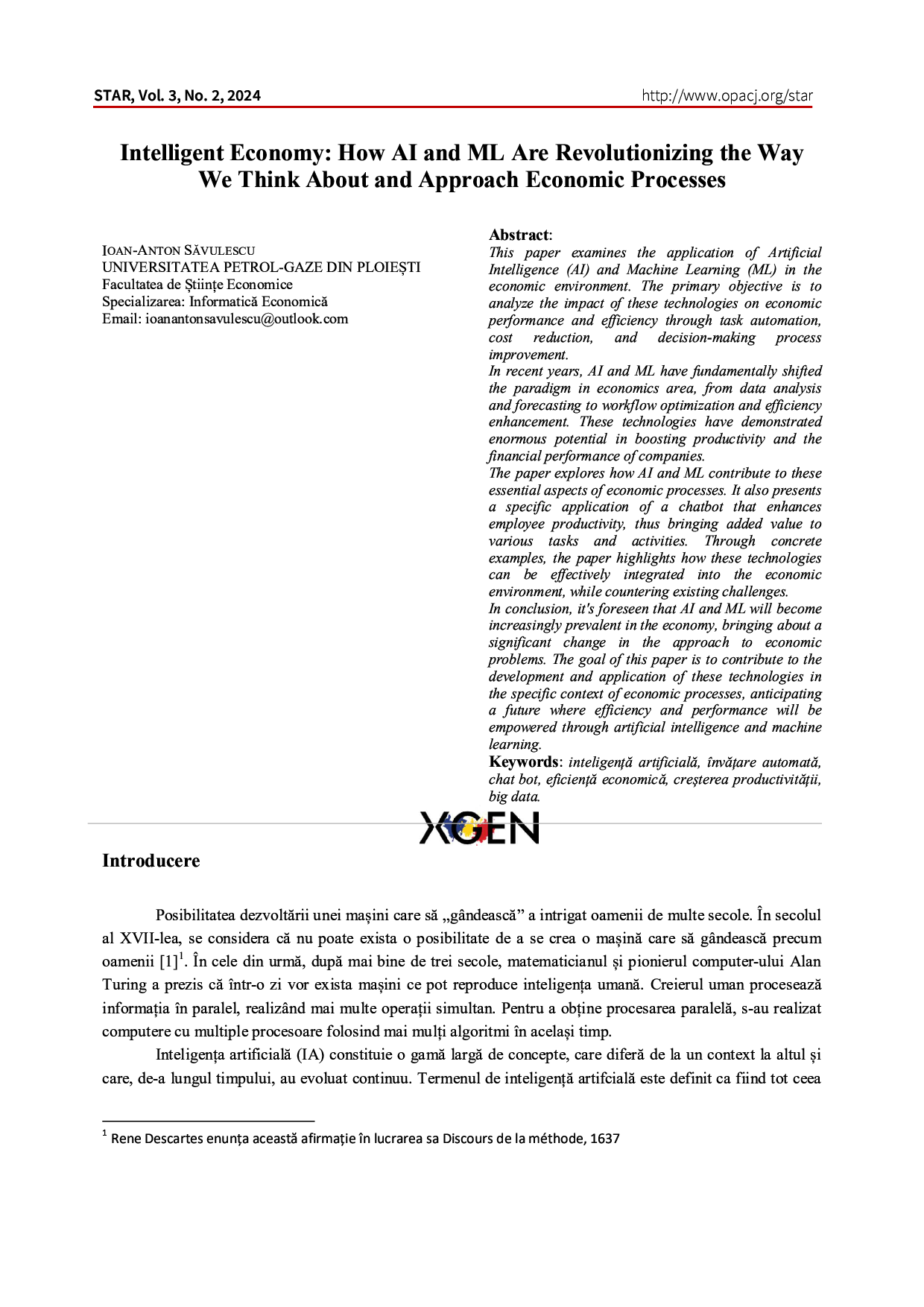
Date Log

This work is licensed under a Creative Commons Attribution-NonCommercial 4.0 International License.
Intelligent Economy: How AI and ML Are Revolutionizing the Way We Think About and Approach Economic Processes
Corresponding Author(s) : IOAN-ANTON SĂVULESCU
Student Thinkers and Advanced Research,
Vol. 3 No. 2 (2024): Proceedings of the 7th International Conference XGEN
Abstract
This paper examines the application of Artificial Intelligence (AI) and Machine Learning (ML) in the economic environment. The primary objective is to analyze the impact of these technologies on economic performance and efficiency through task automation, cost reduction, and decision-making process improvement.
In recent years, AI and ML have fundamentally shifted the paradigm in economics area, from data analysis and forecasting to workflow optimization and efficiency enhancement. These technologies have demonstrated enormous potential in boosting productivity and the financial performance of companies.
The paper explores how AI and ML contribute to these essential aspects of economic processes. It also presents a specific application of a chatbot that enhances employee productivity, thus bringing added value to various tasks and activities. Through concrete examples, the paper highlights how these technologies can be effectively integrated into the economic environment, while countering existing challenges.
In conclusion, it's foreseen that AI and ML will become increasingly prevalent in the economy, bringing about a significant change in the approach to economic problems. The goal of this paper is to contribute to the development and application of these technologies in the specific context of economic processes, anticipating a future where efficiency and performance will be empowered through artificial intelligence and machine learning.
Keywords
Download Citation
Endnote/Zotero/Mendeley (RIS)BibTeX
- R. Descartes, Discours de la méthode, Paris, 1637.
- Florin Leon, Inteligenta artificiala: rationament probabilistic, tehnici de clasificare, Iasi: Tehnopress, 2012.
- A. Mittal, Getting Started with Chatbots, 2019.
- A. Upadhyay, „Private GPT: Pioneering the Path to Confidential Generative AI,” 23 November 2023. [Interactiv]. Available: https://medium.com/@akriti.upadhyay/private-gpt-pioneering-the-path-to-confidential-generative-ai-f4a3c662db52.
- I. W. Advertising, „The ultimate guide to machine-learning chatbots and conversational AI,” 25 Sep 2022. [Interactiv]. Available: https://www.ibm.com/watson-advertising/thought-leadership/machine-learning-chatbot.
- OECD, „Artificial Intelligence, Machine Learning and Big Data in Finance,” 2021.
- A. &. S. N. Da’u, „Recommendation system based on deep learning methods: a systematic review and new directions,” Artificial Intelligence Review, pp. 2709-2748, 2020.
- W. H. A. &. K. H. Medhat, „Sentiment analysis algorithms and applications: A survey,” Ain Shams engineering journal, pp. 1093-1113, 2014.
- D. &. R. P. Acemoglu, „Artificial intelligence, automation, and work.,” în The economics of artificial intelligence: An agenda, Chicago, University of Chicago Press, 2018, pp. 197-236.
- A. M. Turing, Computing Machinery and Intelligence, Oxford: Oxford University Press, 1950.
- Tidio, „The Future of Chatbots: 80+ Chatbot Statistics for 2023,” 4 April 2023. [Interactiv]. Available: https://www.tidio.com/blog/chatbot-statistics/.
References
R. Descartes, Discours de la méthode, Paris, 1637.
Florin Leon, Inteligenta artificiala: rationament probabilistic, tehnici de clasificare, Iasi: Tehnopress, 2012.
A. Mittal, Getting Started with Chatbots, 2019.
A. Upadhyay, „Private GPT: Pioneering the Path to Confidential Generative AI,” 23 November 2023. [Interactiv]. Available: https://medium.com/@akriti.upadhyay/private-gpt-pioneering-the-path-to-confidential-generative-ai-f4a3c662db52.
I. W. Advertising, „The ultimate guide to machine-learning chatbots and conversational AI,” 25 Sep 2022. [Interactiv]. Available: https://www.ibm.com/watson-advertising/thought-leadership/machine-learning-chatbot.
OECD, „Artificial Intelligence, Machine Learning and Big Data in Finance,” 2021.
A. &. S. N. Da’u, „Recommendation system based on deep learning methods: a systematic review and new directions,” Artificial Intelligence Review, pp. 2709-2748, 2020.
W. H. A. &. K. H. Medhat, „Sentiment analysis algorithms and applications: A survey,” Ain Shams engineering journal, pp. 1093-1113, 2014.
D. &. R. P. Acemoglu, „Artificial intelligence, automation, and work.,” în The economics of artificial intelligence: An agenda, Chicago, University of Chicago Press, 2018, pp. 197-236.
A. M. Turing, Computing Machinery and Intelligence, Oxford: Oxford University Press, 1950.
Tidio, „The Future of Chatbots: 80+ Chatbot Statistics for 2023,” 4 April 2023. [Interactiv]. Available: https://www.tidio.com/blog/chatbot-statistics/.